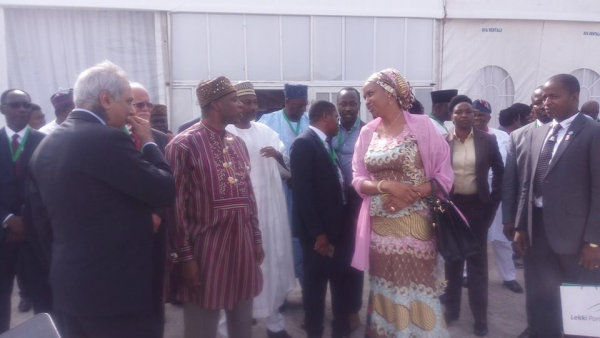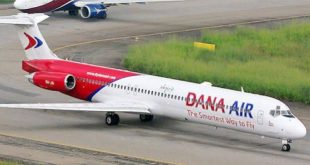
By Oyeniyi Iwakun
As the federal government intensifies efforts to put Nigeria back on the track of sustainable development, the Vice President, Prof. Yemi Osinbajo has said that the Lekki Deep Seaport Project is strategic to the government’s Economic Recovery and Growth Plan (ERGP), and its emphasis on supporting game changing infrastructure projects, directed at making major impact on trade and commerce.
Osinbajo who is also the chairman of the National Economic Council (NEC) explained during the flag-off of the Lekki Deep seaport project in Lagos, yesterday, that the landmark project is very crucial to the economic development of the nation because the promoters of the project are targeting about 1.5 million 20ft equivalent units container capacity annually which is expected to grow to about 2.7million and 4.7million TEUs, when the project operations commence.

The Vice President said that the Lekki Deep seaport would become one of the largest deep water ports in the sub-Sahara Africa and also serve as the hub of ports operations in the whole of West Africa noting that with the plans the promoters have in developing it, the port will possibly be the largest in Africa capable of influencing the generation of about 170,000 direct and indirect jobs in the nation.
“The promoters I am told also plan to dredge the port’s channel to about 16meters draft which is not currently obtainable in any seaport or any port for that matter in the country. This in itself is an indication that ships of larger sizes, like panamas, post panamas and crude carriers would now be able to visit the port; with greater efficiency of scale to generate significant revenues for the Nigerian economy with the government earning a significant portion of it.

“In the first two budgets we have provided an aggregate of about N90 billion for the development of special economic zones. We are developing Lekki Special Economic Zone as a model special economic zone specifically targeting export. The development of this deep seaport is critical to the achievement of the important objective of creating these special economic zones. The reason is the commitment of our economic philosophy to private sector leadership of our economic development efforts. This project is essentially private sector driven”

“The business of government is to contribute by way of equity but more importantly to create an enabling environment for the private sector to do business. While we commend all parties in this project, I will want to specifically mention the Honorable Minister for Transportation whose zeal has continued to drive this project. I will commend him for the way he has been focused on this project. He mentions it every time at the cabinet and everywhere.
“Let me say that we must move ahead to ensure the speedy completion of this project. There will problems as I am sure you have experienced some but be assured that the federal government and the Lagos state government will be with you every step of the way to ensure that we give all the support that is required.” He said.
In his address, the Minister for Transportation, Rt. Hon Rotimi Amaechi said his priorities as the Minister of Transportation is to ensure that laudable infrastructural developments projects are initiated and completed.
Amaechi noted that what Nigeria currently has are the river ports, in Tin-Can Island, Apapa, Port Harcourt, Onne and others with limited capacities, posited that any country that desires to have a fair global maritime market share must consider a deep seaport in its domain. He expressed optimism that the project would help to generate outward and inward cargoes, improve the capacities of our ports for space utilization, will be able to accommodate Panamax and post panamax cargoes, very large crude carriers, ultra large crude carriers and other categories of large vessels.
He said “This will be the first deep seaport in Nigeria and I wish to congratulate Tolaram Group and the Nigeria Ports Authority (NPA). With the deep seaport, modern cargo handling methods and new operating procedures would be created to enable the transfer of skills and technology. The port is expected to be executed through a special purpose vehicle (SPV) Lekki Port, Free Trade Zone enterprise initiative on a non-recourse financing basis.”
Amaechi said the equity participation in the budget is expected to be at the ratio of 75%, 05% to 20% and that the authorities had also granted a concession of the port for 45 years on a Build, Own, Operate and Transfer (BOOT) model even as he assured that the federal ministry of transportation is determined to continue to support projects aimed at improving the quality of infrastructures, ports development and the maritime sector as a whole.
“It is important for Tolaram Group to know that at anytime NPA is able to raise money they will buy and get back their 15%, that was the agreement we had, in favour of the private investor, the federal government itself, NPA and Lagos state government. We will ensure the adherence of NPA to the Data and for the concession and other agreements with respect to this project.
While assuring all investors and prospective investors of the federal government’s is commitment to creating an enabling environment for legitimate businesses, Amaechi thanked the Federal Executive Council, NPA management, Lagos state government, Tolaram group and other stakeholders for their contributions and commitments toward the project.
The Transport Minister informed the audience that he had been able to solve the myriad of problems that had been mitigating against the revitalization and development of the railway transport system in the country for so many years.
In her welcome address, the Managing Director, Nigerian Ports Authority (NPA), Hadiza Bala Usman, while welcoming the guests posited that the event had been long in view.
According to her, the presidential approval for the project was received by NPA in 2002 but due to legislative management and other exigencies in the maritime sector, the concession agreement was signed in 2011 and in 2014 the Federal Executive Council (FEC) ratified the approval that was granted by the president.
She said “NPA has a fully paid the share capital of 5% which is the minimum investment enough to give the private investor confidence and without having any fear of undue interference by the regulator. The other 95% is owned by 18 to 8 sharing ratio by the Lagos state government and the private investors respectively and the 75% share holding owned by Tolaram group where the federal government of Nigeria holds an additional 15% shareholding which is to the value of $107 million.”
As the regulator of ports in the country, Hadiza promises NPA’s commitment to providing all technical support and enabling environment needed for the timely completion of the construction work and ensure efficient management of ports operations.
Copyright MMS Plus.
All rights reserved. This material, and other digital content on this website, may not be reproduced, published, broadcast, rewritten or redistributed in whole or in part without prior express written permission from KINGS COMMUNICATIONS LIMITED.
 MMS PLUS NG – Maritime, Aviation, Business, Oil and Gas News Online Newspaper with coverage in Maritime, Oil and Gas, Aviation, Power and Energy as well as Financial News
MMS PLUS NG – Maritime, Aviation, Business, Oil and Gas News Online Newspaper with coverage in Maritime, Oil and Gas, Aviation, Power and Energy as well as Financial News









